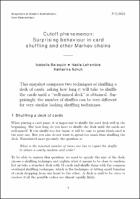| dc.contributor.author | Baraquin, Isabelle | |
| dc.contributor.author | Lafrenière, Nadia | |
| dc.contributor.author | Schuh, Katharina | |
| dc.contributor.editor | Geldhauser, Carina | |
| dc.contributor.editor | Singh, Anup Anand | |
| dc.contributor.editor | Randecker, Anja | |
| dc.date.accessioned | 2023-12-21T14:34:18Z | |
| dc.date.available | 2023-12-21T14:34:18Z | |
| dc.date.issued | 2023-12-21 | |
| dc.identifier.uri | http://publications.mfo.de/handle/mfo/4094 | |
| dc.description.abstract | This snapshot compares two techniques of shuffling a deck of cards, asking how long it will take to shuffle the cards until a “well-mixed deck” is obtained. Surprisingly, the number of shuffles can be very different for very similar looking shuffling techniques. | en_US |
| dc.description.abstract | [Also available in German] | |
| dc.language.iso | en | en_US |
| dc.publisher | Mathematisches Forschungsinstitut Oberwolfach | en_US |
| dc.relation.ispartofseries | Snapshots of modern mathematics from Oberwolfach;2023-05 | |
| dc.relation.hasversion | 10.14760/SNAP-2023-005-DE | |
| dc.rights | Attribution-ShareAlike 4.0 International | * |
| dc.rights.uri | http://creativecommons.org/licenses/by-sa/4.0/ | * |
| dc.title | Cutoff Phenomenon: Surprising Behaviour in Card Shuffling and other Markov Chains | en_US |
| dc.type | Article | en_US |
| dc.identifier.doi | 10.14760/SNAP-2023-005-EN | |
| local.series.id | SNAP-2023-005-EN | en_US |
| local.subject.snapshot | Probability Theory and Statistics | en_US |
| dc.identifier.urn | urn:nbn:de:101:1-2024031812102522232877 | |
| dc.identifier.ppn | 1876848715 | |


